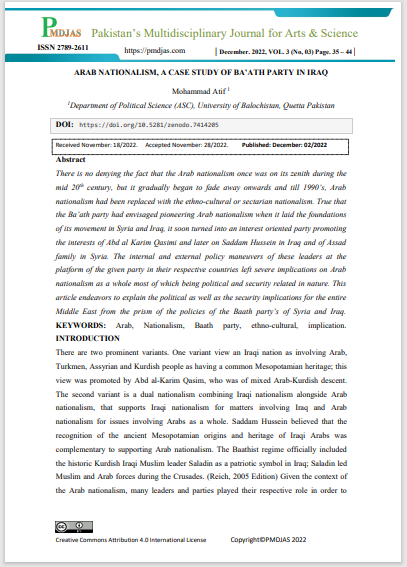Arab Nationalism, A Case Study of BA’ATH Party in Iraq
DOI:
https://doi.org/10.5281/zenodo.7414205Keywords:
Arab, Nationalism, Baath, Party, ethno-cultural, ImplicationAbstract
There is no denying the fact that the Arab nationalism once was on its zenith during the mid 20th century, but it gradually began to fade away onwards and till 1990’s, Arab nationalism had been replaced with the ethno-cultural or sectarian nationalism. True that the Ba’ath party had envisaged pioneering Arab nationalism when it laid the foundations of its movement in Syria and Iraq, it soon turned into an interest oriented party promoting the interests of Abd al Karim Qasimi and later on Saddam Hussein in Iraq and of Assad family in Syria. The internal and external policy maneuvers of these leaders at the platform of the given party in their respective countries left severe implications on Arab nationalism as a whole most of which being political and security related in nature. This article endeavors to explain the political as well as the security implications for the entire Middle East from the prism of the policies of the Baath party’s of Syria and Iraq.
Downloads
References
AbuKhalil, A. (1992). A New Arab Ideology?: The Rejuvenation of Arab Nationalism . Middle East Journal , 46 (1).
Ajami, F. (1991, August 12). "The End of Arab Nationalism," . Washington: The New Republic .
Al-Kaysis, R. (2009). IRAQ Under Saddam Husayn and the Ba’ath party .
Antonius, G. (2015). The Arab awakening: The Story of Arab National Movement.
Bashkin, O. (2009). The other Iraq: pluralism and culture in Hashemite Iraq. Stanford, California,: Stanford University Press.
Bengio, O. (1998). Saddam's Word: Political Discourse in Iraq . New York: Oxford University Press.
Davison, W. P. (1958). The public opinion process. 15 (3).
Dawisha, A. (2004). Arab Nationalism in the Twentieth Century: from Triumph to Despair. Literature Publication .
Hinnebusch, R. A. (2003). The international politics of the Middle East. Manchester, England, : Manchester University Press.
Isakhan, B. (2011). Targeting the Symbolic Dimension of Baathist Iraq: Cultural Destruction, Historical Memory, and National Identity.
Makiya, K. (1993). Cruelty and Silence: War, Tyranny, Uprising, and the Arab World .
New York: Norton.
Mill, J. S. (1988). In the Basic Writings of John Stuart Mill . New York: Modern Library.
Petras, J. (1999). NGOs: In the Service of imperialism (Vol. 29). Journal of Contemporary Asia .
Reich, B. (2005 Edition). Political leaders of the contemporary Middle East and North Africa: A Bibliographical Dictionary. Westport, Connecticut : Greenwood Press, Ltd.
Said, E. (1993). Covering Islam: How the Media and the Experts Determine How We See the Rest of the World. Vintage.
Seeberg, P. (2007, May 11). The weakening of Arab States. Pan-Arabism re-revisited after the invasion of Iraq .
Watts, C. (2014, February ). “Jihadi Competition after Al Qaeda Hegemony -The ‘Old guard’, Team ISIS & the Battle for Jihadist Hearts & Minds”. Foreign Policy Research institute.






